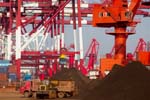Economic growth in Asia likely to bottom out in Q1
Updated: 2012-01-07 10:49
(Xinhua)
|
|||||||||||
SINGAPORE - The economic growth in most Asian economies is expected to bottom out in the first quarter on year- on-year terms, analysts of banking giant Credit Suisse said on Friday.
The outlook for Asia excluding Japan has been improving recently as the inflation came down from their peaks and the growth and the United States economy showed clearer signs of picking up, said Robert Prior-Wandesforde, director of non-Japan Asia economics.
"That is more constructive than we have been for the last 12 to 18 months," he told reporters in Singapore.
Prior-Wandesforde said that the bank's central forecast for the eurozone is that there won't be a catastrophe in Europe over the next 12 months.
He said the inflation in Asia will fall quite heavily over the next few months as commodities prices soften, allowing more room for the policy makers to focus on growth.
Dong Tao, managing director for non-Japan Asia economics at Credit Suisse Hong Kong, said he expected China to be slowing for longer as the world's second largest economy digests the imbalances that had been formed over the past three years of expansionary fiscal policies.
China "overstretched itself a bit" in the past three years, he said, adding that it would take a few years to correct the imbalances.
The bank forecast China's growth to slow down to the pace of 7- 7.5 percent in the first half of 2012 before picking up to achieve a growth of 8 percent for the full year.
Tao said he expected the China's economy to have a slowdown over the medium term to annual growths of 7-9 percent. It is expected to grow by 8 percent in 2013, as no super factors like the WTO accession and the housing boom that has driven the China's economy in the recent years are emerging.
"Certainly China is not in a hurry to get back to the double- digit growth," he said.
He cited challenges for China such as the banking sector failing its role as the financial intermediary. Most of the capital in the bank are either locked or slowed down in terms of their velocity due to factors such as the reserve requirements, the local government debts, the trust fund as well as the State- owned enterprises.
The environment is also not encouraging people to invest in the real economy as the yield from lending remained high, he said.
The real property sector, the informal lending and the local government debts were among the risk factors, he said.
Tao said recently that he expected the China's housing prices to fall by 15-20 percent in 2012.
The policy makers are not likely to ease the monetary polices in the near term as the interest rates are now actually below the historical average.
He said he expected the Chinese yuan to manage an appreciation of 3-4 percentage points against the United States dollar " regardless of where the fundamental are."
"This is election year, and China does not want to engage in a trade war. The lawmakers at Capitol Hill has no clue where the real exchange rate is about," he said.
In the meanwhile, the wages of the workers at the lower end will continue to increase, as a pillar policy to drive the domestic consumption.
- Clouds on economic horizon: ex-trade official
- Buffett to welcome Chinese New Year in song
- Tea firms set to explore high-end int'l market
- Inspectors had hands full in 2011
- Beijing to release PM 2.5 data
- Nation 'at key point' in economic growth
- Greater say needed on convertibility
- CSRC tightens ChiNext rules









